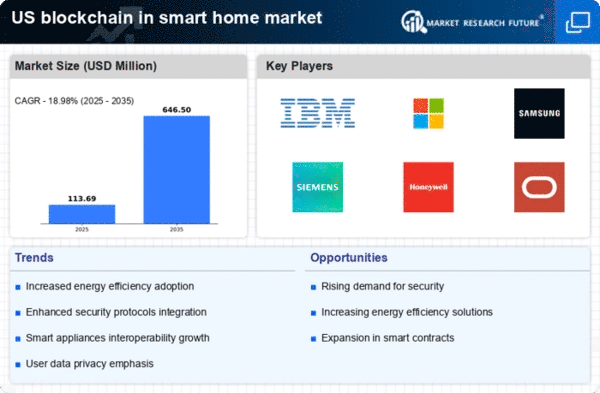Interoperability of Devices
Interoperability among various smart home devices is a crucial factor influencing the blockchain in-smart-home market. As consumers invest in multiple smart devices, the ability for these devices to communicate seamlessly becomes essential. Blockchain technology can facilitate this interoperability by providing a standardized framework for device communication and data sharing. This capability not only enhances user experience but also encourages the adoption of smart home technologies. Market Research Future suggest that the market for interoperable smart home devices could grow by over 40% in the next five years, driven by the integration of blockchain solutions.
Cost Efficiency through Automation
Cost efficiency is a pivotal driver in the blockchain in-smart-home market, as automation facilitated by blockchain technology can significantly reduce operational costs. By automating processes such as energy management and security monitoring, homeowners can achieve substantial savings. Reports indicate that households utilizing smart home technologies can save up to 30% on energy bills. Furthermore, the decentralized nature of blockchain minimizes the need for intermediaries, thereby reducing transaction costs. This potential for cost savings is likely to attract more consumers to adopt blockchain-enabled smart home solutions, further propelling market growth.
Support from Technology Innovators
Support from technology innovators is a significant driver in the blockchain in-smart-home market. Major tech companies are investing heavily in blockchain research and development, recognizing its potential to revolutionize smart home solutions. Collaborations between blockchain startups and established tech firms are becoming more common, leading to the creation of innovative products that leverage blockchain capabilities. This trend is likely to foster a competitive landscape, encouraging further advancements in the market. As these innovations emerge, they may attract a broader consumer base, ultimately contributing to the growth of the blockchain in-smart-home market.
Enhanced Data Privacy and Ownership
Data privacy and ownership are increasingly important in the blockchain in-smart-home market. Consumers are becoming more aware of the risks associated with data breaches and unauthorized access to personal information. Blockchain technology offers a solution by enabling users to maintain control over their data through decentralized storage and encryption. This enhanced privacy is likely to resonate with consumers, as studies show that 65% of individuals prioritize data security when considering smart home technologies. As awareness of data privacy issues grows, the blockchain in-smart-home market may see accelerated adoption rates.
Increased Consumer Demand for Smart Solutions
The blockchain in-smart-home market is experiencing a surge in consumer demand for smart home solutions that enhance convenience and security. As households increasingly adopt smart devices, the integration of blockchain technology offers a unique value proposition. This technology ensures secure transactions and data integrity, which are critical for consumer trust. According to recent surveys, approximately 70% of consumers express interest in smart home technologies that utilize blockchain for enhanced security. This growing demand is likely to drive innovation and investment in the blockchain in-smart-home market, as companies strive to meet consumer expectations and differentiate their offerings.
















